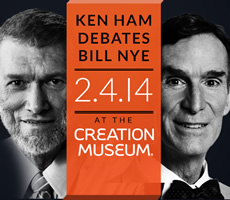By Michael Wren
In case any of you hadn’t encountered this, last weekend was established as Evolution Weekend by a movement known as The Clergy Letter Project. Across the world, 597 congregations dedicated their weekend services to reflect on the relationship between science and religion in order to demonstrate that numerous clergy around the world have embraced the theory of evolution and find it fully harmonious with religious faith. In last week’s debate over creation and evolution, Bill Nye pointed out at least twice that millions of religious people around the world affirm the theory of evolution. They do so because of two convictions: 1) The Bible conveys important religious truths, and 2) the scientific consensus regarding evolution and the age of the earth cannot be denied. They desire earnestly to demonstrate that Christian truth is not opposed to the scientific consensus.
If so many Christian leaders hold this conviction (and nearly 13,000 have signed the Clergy Letter stating these convictions), why would evangelicals attempt to deny evolution? If so much evidence is stacked against a creation model, why would anyone attempt to stand against the inexorably rising tide? The effort reminds me of the beautiful city of Venice, with a rich history, a thriving culture, and a vibrant populace that sees more of their city underwater with each passing year. Are we living in a sinking city?
The answer to this question is not found by debating merely about fossils and rocks. The core issue is about the nature of truth and authority. Why do we believe what the Bible teaches? How do we know that the Bible contains important religious truths? How can a human know about God in the first place? The Clergy Letter states that the Bible conveys truths “about God, human beings, and the proper relationship between Creator and creation” in a timeless form that is capable of being passed down from generation to generation. However, religious truth is different from scientific truth: “Its purpose is not to convey scientific information, but to transform hearts.” On this model, the Bible is believed to contain spiritual truths, while science conveys empirical truths about the world around us. We learn about spiritual things from the Bible and about the world around us from science. The two “comfortably coexist.”
There is no question that the findings of science and the teachings of Scripture ought to coexist comfortably. However, the truth statements found in the Bible cannot responsibly be understood the way the Clergy Letter seeks to define them. If the Bible made no claims about nature or history, there would be no tension to try to resolve. But it does make such claims. It does not claim to present to us “timeless tales,” but rather, to relate to us actual historical events. Both our Lord Jesus and the Apostle Paul teach that Adam and Eve were actual historical figures. Jesus bases his teachings on marriage upon the fact that God had created male and female and placed the first couple together in marriage (Mat 19:4-5). Similarly, the Apostle Paul teaches that just as Adam sinned in the Garden of Eden, and his sin had consequences for all of humanity, so the Lord Jesus died on the cross, and his death carried with it consequences for humanity. Important biblical teaching on marriage and the atonement are based upon the historical existence of Adam and Eve.
But the Bible continues to make historical claims after Genesis three. One of the most important is found in Genesis 12, where God selected one man, Abraham, to be the bearer of an incredible promise that would bring blessing to the whole earth. Later in Scripture, God refers back to that promise repeatedly as the foundation of his relationship with Israel. If Abraham didn’t exist, Israel’s faith was based upon fiction. Likewise, the Ten Commandments state plainly that Israel’s relationship with God was founded upon historical fact: “I am the Lord your God who brought you out of Egypt, out of the house of slavery (Exodus 20:2). And then what about our Lord Jesus? If the historical existence of Adam and Eve or Abraham or the Exodus isn’t critical to our faith, then what about the death and resurrection of Jesus? Sure, very few people would be willing to deny that Jesus existed, or even that he was crucified, but what about the resurrection?
In short, Christian theology is grounded upon the conviction that God acts in history. If we allow our beliefs to be suspended pending further scientific and historical inquiry how are we going to determine what is true about God at all? Did Jesus rise from the dead? Was King David a real person? Did God really part the Red Sea? Was Abraham real? Scientists want to tell us, “We’ll let you know when we figure it out.” What does this leave us with? Some heartwarming stories?
And this brings the disagreement to its most critical issue: do we decide for ourselves what God is like and how He has acted, or does the Bible inform us of this? If you embrace the model affirmed by supporters of evolution, the answer is that we decide this for ourselves. Ian Barbour, former Bean professor of Science, Technology, and Society at Carleton College, demonstrated this repeatedly in his renowned Gifford Lectures at the University of Aberdeen (1989-1991). Barbour stridently maintained that God guided the process of evolution, but also believed that the evolutionary process happens through chance mutations. He then redefined God’s providential role over creation to account for the existence of chance. You see, if we take the responsibility to formulate Christian theology based upon our own ideas, it is not only our view of the natural world that will be affected. We will redefine the nature of God, the nature of humanity, the doctrine of salvation, and the doctrine of last things. All of theology will be affected.
On the other hand, the Bible maintains that the truth of God must be revealed to us if we are to know it. Repeatedly the prophets spoke only because God had spoken to them. The Apostle Paul stated the problem succinctly: “For though they knew God, they did not glorify Him as God or show gratitude. Instead, their thinking became nonsense, and their senseless minds were darkened. Claiming to be wise, they became fools,” (Rom 1:21-22). Sin has corrupted our ability to think about God clearly. God must speak, and thankfully He has, as the author of the letter to the Hebrews reminds us: “Long ago God spoke to the fathers by the prophets at different times and in different ways. In these last days, He has spoken to us by His Son.”
It seems as if, in this modern world, evangelical Christians are putting up sand bags trying to hold back the rising tide, or worse yet, casually strolling the streets of our great city while water reaches to our ankles. We are, however, convinced that God must reveal himself, and that we do not have the ability to figure out what He is like on our own. We still believe that science and Christian teaching should coexist, and it is for this reason that we explore other scientific explanations for the early history of the universe. I would be more comfortable if the current scientific consensus were in harmony with Scripture, but as it currently stands, I will place myself on the side of God’s revelation and hope for harmony at a later time. After all, Jesus has promised us that our city is not actually sinking. He said in fact, that “the gates of Hell shall not prevail against it,” (Mat 16:18).



